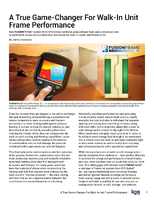Film Insert Molding for Large Glazing Applications with Polycarbonate
New injection molding system as an innovation platform for technology, application and material development
Excellent molded part quality thanks to adapted process and mold technology
Leverkusen, June 30, 2009 - Large 3D automotive glazing components made of polycarbonate, such as panorama roofs, are currently all the rage thanks to the distinctive vehicle design style and the potential they offer for reducing weight. Injection-compression molding has proven to be the process of choice when it comes to manufacturing these parts in series production, because at reduced injection pressure it delivers low-stress and low-distortion components with excellent surface quality that lend themselves to the application of wetcoats. To enable the further development of these technologies and expand its service offering for customers, Bayer MaterialScience AG has installed a fully automatic, robot-aided two-component swivel-plate injection molding machine with 2,300 metric tons clamp tonnage at its technical service center in Leverkusen.
"The system will serve as a platform so that we can work with partners on developing new glazing applications using Makrolon® and opening up additional innovative technologies, such as using film back-injection to produce large 3D glazing components," explains Olaf Zallner, head of the Injection Molding Team at Bayer MaterialScience. "It will also help us better understand our customers' entire process chain, undertake further development in areas such as melt treatment, parallelism checks and automation, and expand our BayVision® customer service. That means that molds of large customer components can now also be trialed in Leverkusen." Bayer MaterialScience will use the system to further optimize customized glazing materials for the first and second components.
Integrated film insert molding
One special feature of the injection molding machine is that it can be used to produce large components measuring 1.2 m2 using a process known as film insert molding (FIM). Films play a key role in concepts for rear windows made of polycarbonate and in the design of polycarbonate panorama roofs, for example. They enable the implementation of decorative effects and the integration of additional functions. For example, lettering, logos or fade-outs can be applied to the films before the back-injection process. In rear windows made of polycarbonate, films can be used to integrate defrosters for the glazing heating system. Defrosters, for example, could consist of thin heating filaments or conductive, thinly-applied pastes. Similarly, it would also be possible to integrate antennas. It would also be feasible to use films to provide IR sunlight protection for vehicle interiors.
The size of the molded parts places tough demands on the plane parallelism of the locking plate - particularly for asymmetric, off-center sprue designs that subject the columns of the locking plate to a wide range of stresses. "We have installed a new type of software program that works in conjunction with pressure measurements taken on each of the tie-bars to identify immediately even the slightest change in parallelism, thus enabling us to initiate countermeasures that ensure the components are produced with as uniform a wall thickness as possible," explains Zallner.
Segmented cooling for the mold and center plate
Effective temperature control is essential for a high optical quality and efficient coating of large polycarbonate glazing components. The new injection-compression molding machine is equipped with 17 temperature control units, which enable segmented and close-contour temperature control for the molds and molded parts. The temperature of the swivel platen is controlled separately. It is fitted with ten water feedthroughs for 24 temperature control channels. This concept makes it possible to independently control the thermal economy of the center plate and flanged mold halves, thus ensuring optimum quality of the molded parts while keeping cycle times to a minimum.
The new system is designed as a two-component machine to enable, for example, the direct injection of frame components on the glazing unit and the integration of functions such as rear spoilers, light housings and roof rails. "The 2-component concept allows us to develop and optimize new materials for the first and second components under production conditions for near-series molds," adds Zallner. It can be used for various types of injection-compression molding. "As part of our customer service offering, we will sound out the advantages and disadvantages of each process for a specific component and determine the process parameters to ensure that the machine and mold are perfectly attuned to each other," explains Zöllner. The customer service will also deal with questions relating to melt preparation for large volumes of molded parts. For example, the experts in the automotive glazing team will test various screw geometries and coatings and check them as a function of the process parameters.
BayVision® - service at every stage of development
All the named services are part of BayVision®, the competence brand that brings together Bayer MaterialScience's complete expertise in automotive glazing with Makrolon® polycarbonate. BayVision® is supported by comprehensive know-how and services for automobile manufacturers and system suppliers across all parts of the process chain. The brand also benefits from visionary glazing concept studies, which the company develops independently to highlight possible applications for polycarbonate glazing and to provide new impetus.
About Bayer MaterialScience:
With 2008 sales of EUR 9.7 billion, Bayer MaterialScience is among the world's largest polymer companies. Business activities are focused on the manufacture of high-tech polymer materials and the development of innovative solutions for products used in many areas of daily life. The main segments served are the automotive, electrical and electronics, construction and the sports and leisure industries. At the end of 2008, Bayer MaterialScience had 30 production sites and employed approximately 15,100 people around the globe. Bayer MaterialScience is a Bayer Group company.
More information is available at www.bayermaterialscience.com. Further press documents on automotive glazing and photos of the new two component injection molding machine are available for download at www.press.bayerbms.com.




